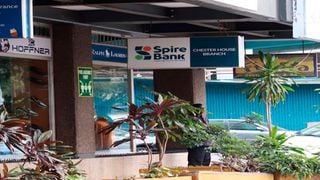
A Spire Bank branch on Koinange Street in Nairobi in May 2020.
Finance and Markets
Premium
Shake-up at Mwalimu Sacco as bosses sent home
The Sacco regulator has cracked the whip at the giant teachers Sacco, Mwalimu National, after it asked the chairman and the chief executive officer to step aside to allow for investigation.
The Nation has learnt that Wellington Otiende (national chairman) and the chief executive officer Alphonse Kaio were pushed out to allow officials of Sacco Societies Regulatory Authority (Sasra) to carry out an independent probe following allegations of bad investment decisions that have rocked the Sacco.
“It is true (we have stepped aside). The regulator has the powers to request people to step aside and we have complied. But I would like to assure members that there is nothing to worry about since no money is lost and there is no governance issue at the Sacco,” Mr Otiende told Nation.
He revealed that the investigation is about the performance of the Sacco subsidiaries and that the Sacco is solid and is still lending out money to members as always.
“Everything we did is under the purview of the board and the delegates which are the representatives of teachers,” he said, adding that his deputy is now in charge.
Mwalimu Sacco deputy chief executive Kenneth Odhiambo has now been appointed the acting CEO while Mr James Oirere, who is the current national vice chairperson, will now be the acting chair pending the outcome of the investigation.
104,000 teachers
Sasra is expected to issue an official statement today.
Sources indicate that the move by Sasra is meant to protect the interests of more than 104,000 teachers, who are members of the Sacco, adding that there is nothing for members to worry about since all their investments are still secured in the action.
Teachers are being forced to pay the price for a hurried Sh2.4 billion purchase of the bank from billionaire Naushad Noorali Merali in 2014.
This comes at a time when a section of teachers now want delegates at Mwalimu National Sacco to resign fearing they would plunge the Sacco into a deeper financial mess.
In a recent communiqué to teachers, Mr Otiende, who was recently elected for another three year term, said that between 2014 and 2016, the Sacco undertook major investment decisions such as construction of its headquarters, Kisaju houses and the bank, which have tied members’ money.
"This has been compounded by the loss-making subsidiaries such as the bank," Mr Otiende said. He also explained that the former shareholder of Spire Bank, Mr Naushad Noorali Merali, a billionaire who has made his money buying and selling off struggling companies, withdrew his deposits from the bank in 2016 amounting to Sh1.7 billion, weakening the bank’s liquidity position.
The Sacco said it had been operating on an overdraft facility of Sh1.35 billion per month till November 2019, which was a major pain for the Sacco. It also restructured a term loan of Sh3.65 billion to a cheaper loan.
"As members are aware, Mwalimu National has never been in such a perilous situation. Since its founding in 1974, the Sacco had been the most stable savings and credit cooperative society in Kenya and Africa," Mr Otiende said as he pleaded with members to give his team more time to sell the bank.
The loss-making bank has become a major drag on the giant Sacco, putting at stake savings of more than 104,000 teachers.
Teachers are now staring at losing at least Sh2.4 billion they invested in buying the bank more than six years ago on top of cash injections they have done through the Sacco to keep it afloat over the years.
Wrath of teachers
At their recent Annual Delegates Meeting, the Sacco officials locked out journalists as they faced the wrath of angry representatives of teachers.
The teacher’s bank is facing a dire cash crisis and is facing a slow and painful death unless teachers through Mwalimu Sacco pump in at least Sh4 billion to enable it meet the statutory requirements and put it on course to getting a strategic investor.
The other decision will be to cut it off and sell it, at a loss. But selling it in its current form will see teachers take a hit on their Sh2.4 billion investment, which will eat into their dividends. It will be a seven-year wait in futility.
Spire Bank's management see reviving the bank as the best option, before selling it, since finding bank buyers in the current environment is a herculean task.





